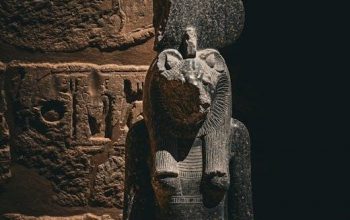Bengal Tiger at the Baghdad Zoo⁚ A Comprehensive Overview
Rajiv Joseph’s acclaimed play, Bengal Tiger at the Baghdad Zoo, explores the absurdity of war through the lens of a ghostly Bengal tiger haunting war-torn Baghdad․ The play intertwines the lives of American soldiers and Iraqi civilians, grappling with themes of morality, redemption, and the search for meaning amidst chaos․ Available through Dramatists Play Service, it’s a Pulitzer Prize finalist․
The Play’s Premise and Setting
Rajiv Joseph’s Bengal Tiger at the Baghdad Zoo unfolds in the ravaged landscape of Baghdad during the tumultuous early days of the 2003 Iraq War․ The play’s central premise revolves around a Bengal tiger, inexplicably imbued with sentience and the ability to interact with the living, even after its death․ This spectral tiger serves as a darkly comic, yet insightful narrator, observing and commenting upon the chaotic events unfolding around it․ The setting itself—a war-torn zoo, a symbol of both the destruction of natural order and the fragility of life—becomes a microcosm of the larger conflict․ The dilapidated zoo, with its shattered cages and lingering sense of loss, provides a stark backdrop for the play’s exploration of the human condition under duress․ The tiger’s presence adds a layer of surrealism to the already unsettling reality of war, forcing the audience to confront the absurdity and profound consequences of conflict․
Major Characters and Their Intertwined Destinies
The play features a compelling cast of characters whose lives become inextricably linked through their encounters with the ghostly Bengal tiger․ Two American Marines, Kev and Tom, find themselves stationed at the Baghdad Zoo, their experiences shaped by the war’s brutality and the tiger’s spectral presence․ Their contrasting personalities and reactions to the conflict highlight the diverse ways individuals cope with trauma and moral ambiguity․ Musa, an Iraqi translator, is another key figure, caught between two worlds and grappling with his own past traumas․ His interactions with the tiger and the American soldiers reveal the deep-seated complexities of the war’s impact on the Iraqi people․ Uday, a ghost from Saddam Hussein’s regime, adds a layer of historical context and fuels the play’s exploration of power, violence, and their enduring consequences․ The characters’ intertwined destinies highlight the lasting impact of war and the interconnectedness of their experiences, even in death․
Themes Explored⁚ War, Transcendence, and the Absurd
Bengal Tiger at the Baghdad Zoo delves into profound themes, using the surreal backdrop of war-torn Baghdad to explore the human condition․ The play masterfully portrays the absurdity of war, highlighting its illogical and often meaningless nature through the interactions of the characters and the tiger’s spectral commentary․ The conflict’s impact on the soldiers’ psyches is a central theme, showcasing the psychological toll of violence and the struggle to find meaning in senseless acts of aggression․ The concept of transcendence is interwoven throughout, as characters grapple with mortality and their place in a world marked by death and destruction․ The tiger’s ghostly presence allows for exploration of the afterlife and spiritual questioning, challenging conventional notions of existence and purpose․ The interplay of these complex themes creates a thought-provoking narrative that transcends the literal setting, prompting reflection on the human experience in the face of unimaginable suffering and loss․
Critical Acclaim and Awards⁚ Pulitzer Prize Nomination and More
Rajiv Joseph’s Bengal Tiger at the Baghdad Zoo garnered significant critical acclaim and prestigious award nominations upon its release․ The play’s innovative approach to storytelling and its exploration of complex themes resonated with audiences and critics alike; A notable achievement was its nomination for the Pulitzer Prize in Drama, a testament to its literary merit and theatrical impact․ Beyond the Pulitzer nomination, the production also received recognition for its powerful portrayal of the Iraq War’s consequences and its unique use of the tiger as a symbolic figure․ Reviews praised its darkly comedic tone, its exploration of moral ambiguity, and its ability to evoke both laughter and profound reflection on the human condition in times of conflict․ The play’s success led to numerous productions worldwide, further solidifying its status as a significant contribution to contemporary American drama․ The accolades highlight the play’s enduring power and its ability to spark meaningful dialogue about war, loss, and the search for meaning in a chaotic world․ The impact of such critical recognition extends beyond the initial production, ensuring the play’s continued relevance and study․
Notable Productions⁚ Broadway Debut and International Stages
Bengal Tiger at the Baghdad Zoo enjoyed a successful run on Broadway, marking a significant milestone in its theatrical journey․ The Broadway production, notably featuring Robin Williams in his Broadway debut, garnered considerable attention and critical acclaim․ This high-profile production significantly increased the play’s visibility and broadened its audience reach․ Beyond its Broadway debut, the play has graced numerous stages internationally, demonstrating its universal appeal and adaptability across diverse cultural contexts․ Productions in various countries have allowed audiences worldwide to engage with Joseph’s powerful narrative and explore the play’s universal themes of war, loss, and the search for meaning․ This international reach speaks to the play’s enduring power and its capacity to resonate with audiences beyond its initial American context․ The diverse interpretations and adaptations across different stages reflect the play’s flexibility and its capacity to evoke varied responses, making it a truly globally significant theatrical work․ Its impact extends beyond the stage, fostering discussions on conflict and the human experience․
The Role of Robin Williams in the Broadway Production
Robin Williams’s participation in the Broadway production of Bengal Tiger at the Baghdad Zoo holds a special place in the play’s history․ His performance as the titular Bengal tiger marked his highly anticipated Broadway debut, drawing significant media attention and attracting a wider audience to the production․ Williams, known for his comedic timing and dramatic range, brought a unique depth and pathos to the role of the ghostly tiger, navigating the play’s complex blend of dark humor and profound existential questioning․ His portrayal of the tiger, a character grappling with the aftermath of war and the search for meaning, resonated deeply with audiences․ Reviews often highlighted Williams’s ability to capture both the tiger’s sardonic wit and his underlying vulnerability, adding a layer of emotional complexity to the already nuanced character․ The production’s success was in part attributed to Williams’s star power and his compelling performance, solidifying the play’s place in the theatrical landscape and ensuring its lasting legacy․
The Play’s Darkly Comic Tone and Unique Narrative Structure
Bengal Tiger at the Baghdad Zoo masterfully blends dark humor with profound tragedy, creating a darkly comic tone that both unsettles and engages the audience․ The play’s unconventional narrative structure, largely driven by the ghostly tiger’s perspective, further enhances this effect․ The tiger acts as both narrator and active participant, weaving together fragmented memories and surreal encounters․ This non-linear storytelling allows the play to explore multiple viewpoints simultaneously, highlighting the chaos and disorientation of war․ The juxtaposition of morbid events with witty dialogue, often delivered by the tiger, prevents the play from becoming overly bleak․ The darkly comic elements serve as a coping mechanism for the characters and a way for the audience to process the traumatic realities depicted․ This unique blend of humor and horror is a defining characteristic of the play, making it both thought-provoking and entertaining․
Exploration of Moral Ambiguity and the Aftermath of War
Rajiv Joseph’s Bengal Tiger at the Baghdad Zoo delves into the complex moral ambiguities that arise from war, refusing to offer easy answers or simplistic judgments․ The play portrays the psychological toll of conflict on both American soldiers and Iraqi civilians, exploring the lingering trauma and moral compromises made in the face of violence․ The actions of the characters are often morally gray, reflecting the complexities of wartime decisions․ The play doesn’t shy away from depicting the brutality and dehumanization inherent in war, yet it also acknowledges the human capacity for compassion and redemption, even amidst the chaos․ The aftermath of war is depicted not merely as physical destruction but also as a profound psychological and emotional scarring․ The characters’ struggles with guilt, PTSD, and the search for meaning in a world irrevocably altered by conflict are central to the play’s exploration of the lasting impact of war․ The play suggests that the consequences of war extend far beyond the battlefield, leaving an enduring legacy of moral ambiguity and trauma․
The Tiger as a Metaphorical Figure⁚ Symbolism and Interpretation
In Rajiv Joseph’s Bengal Tiger at the Baghdad Zoo, the titular tiger transcends its literal representation, functioning as a potent symbol with multiple layers of meaning․ The tiger, initially a captive creature, becomes a ghostly narrator, offering commentary on the human condition amidst the backdrop of war․ Its presence serves as a critique of power dynamics, representing both the oppressed and the oppressor․ The tiger’s supernatural abilities and interactions with characters highlight the spiritual and existential questions raised by the conflict․ The tiger’s journey can be interpreted as a representation of the search for meaning and purpose in a world marred by violence and chaos․ Some view the tiger as a symbol of the Iraqi people, struggling against foreign occupation․ Others see it as a representation of the conscience, questioning the morality of war and its consequences․ Ultimately, the tiger’s symbolism is open to interpretation, enriching the play’s thematic depth and allowing for diverse perspectives on the complexities of war and its aftermath․ The ambiguity of the tiger’s character adds to the overall moral ambiguity of the play․
Availability of the Play⁚ Licensing and Publication
Securing performance rights and accessing the script for Bengal Tiger at the Baghdad Zoo is facilitated primarily through Dramatists Play Service (DPS), a renowned theatrical licensing agency․ DPS holds the rights for both professional and amateur productions within the United States, its territories, and Canada․ While a readily available PDF of the full script isn’t commonly found through standard online channels, the official route for acquiring the script is through DPS’s licensing process․ This ensures legal compliance for any intended staging․ Interested parties should visit the DPS website to explore licensing options, fees, and the necessary paperwork․ Information regarding potential educational or academic uses might also be found there․ This method safeguards the playwright’s intellectual property and supports the theatrical community․ Though unauthorized copies may circulate online, using official channels ensures ethical access and contributes to the support of theatrical works and their creators․ Obtaining the script through DPS is essential for legitimate productions․
Plot Summary and Key Events⁚ A Concise Overview

Bengal Tiger at the Baghdad Zoo unfolds in war-torn Baghdad, 2003․ The play centers around a Bengal tiger, shot by an American soldier named Kev, who then becomes a ghostly presence․ Kev, haunted by his actions and the tiger’s spectral pronouncements, experiences a mental breakdown․ His fellow soldier, Tom, returns to Baghdad seeking a golden gun stolen from Uday Hussein (a son of Saddam), a gun Kev used to kill the tiger․ Meanwhile, Musa, an Iraqi translator, possesses the gun, plagued by hallucinations of Uday․ Tom and Musa engage in a tense exchange, leading to violence and further tragedy․ The tiger, possessing newfound cosmic awareness, interacts with various characters, including a young girl he had previously encountered․ The play explores themes of war’s impact, guilt, and the search for meaning, culminating in multiple deaths and a lingering sense of profound loss and unanswered questions, leaving the audience to contemplate the consequences of war and the elusive nature of truth and justice․
Resources for Further Study⁚ Study Guides and Critical Analyses

For in-depth exploration of Rajiv Joseph’s Bengal Tiger at the Baghdad Zoo, several resources are readily available․ GradeSaver provides a comprehensive study guide including chapter summaries, character analyses, and thematic explorations, offering a robust framework for understanding the play’s complexities․ Dramatists Play Service, the play’s publisher, may offer supplementary materials or links to critical essays․ Academic databases like JSTOR and Project MUSE contain scholarly articles analyzing the play’s themes, dramatic techniques, and historical context within the Iraq War․ Searching online booksellers for “Bengal Tiger at the Baghdad Zoo critical essays” will yield various critical analyses from literary scholars and theater critics; These resources offer diverse perspectives, enriching the understanding of the play’s narrative, character development, and its enduring relevance in contemporary discussions about war, trauma, and the search for meaning in the face of profound loss and suffering․ Remember to consult reputable academic sources for the most insightful and accurate interpretations․



